Solar Installers Lake Geneva
Find Local Solar Installers in Lake Geneva
Get up to 3 Solar Installers quotes for your project today! Compare profiles, reviews, accreditations, portfolio, etc... and choose the best deal.
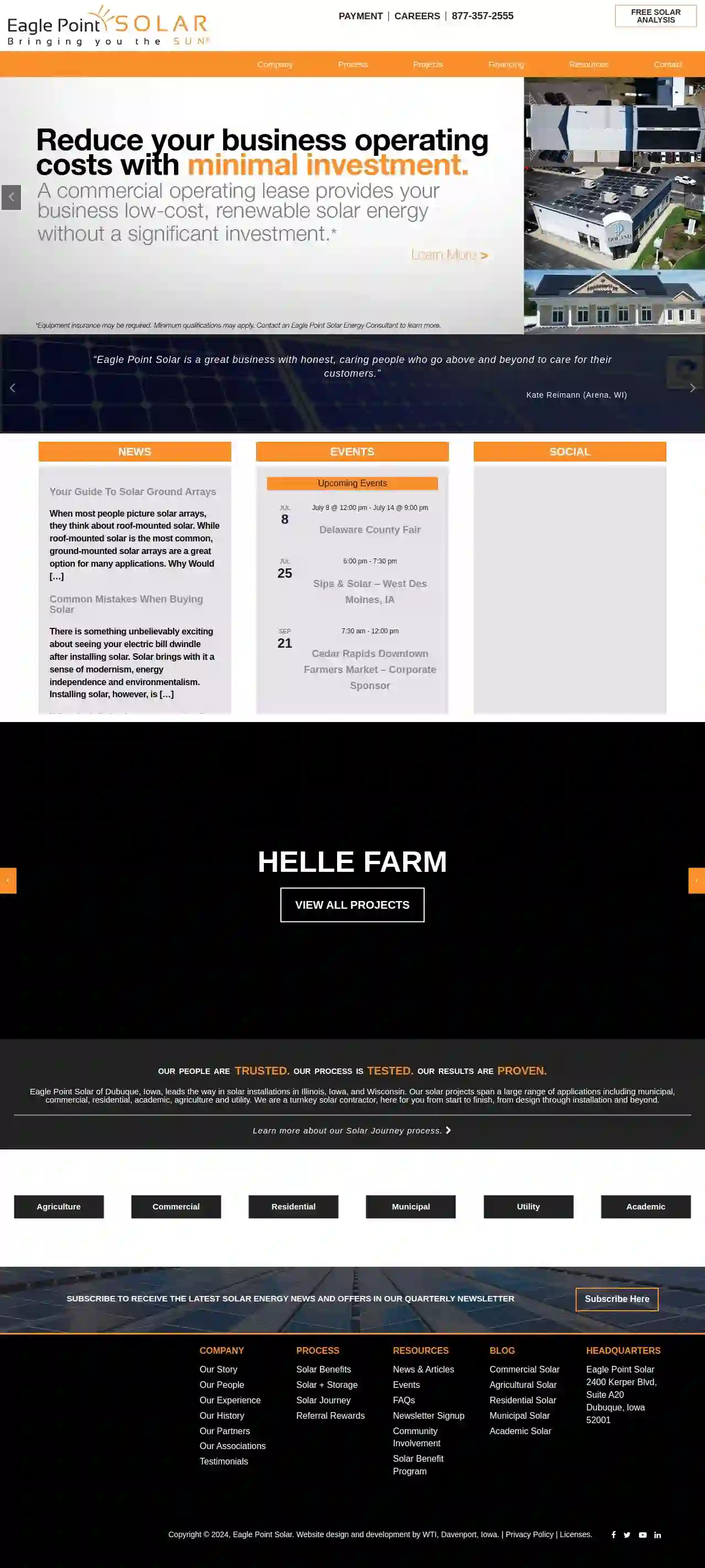
Eagle Point Solar
4.5158 reviews2400 Kerper Blvd, Suite A20, Dubuque, 52001, USEagle Point Solar is a leading provider of solar energy solutions, dedicated to helping individuals and businesses harness the power of the sun. With a strong commitment to sustainability and customer satisfaction, Eagle Point Solar offers a range of services including solar panel installation, solar storage solutions, and solar maintenance. Their team of experienced professionals ensures that every project meets the highest standards of quality and efficiency.
- Services
- Why Us?
- Accreditations
- Our Team
- Testimonials
- Gallery
Get Quote
Epic Electric and Solar Inc.
48 reviewsEpic Electric and Solar Inc., 1310 Droster Rd, 1310 Droster Road, Madison, 53716, USEpic Electric and Solar is a residential electrical service provider specializing in electrical services and solar installations. They are dedicated to providing customer service that is second to none. Their mission is to save customers time and money by combining deep experience, high-quality parts, and dedication to delivering exceptional service.
- Services
- Why Us?
- Accreditations
- Our Team
- Testimonials
- Gallery
Get Quote
SunPeak
544 reviews1026 Ann Street, Madison, WI, 53713, USSunPeak Power is a full-service commercial solar PV provider specializing in the design, installation, and maintenance of commercial systems. They offer a comprehensive process, known as the Roadmap to Solar, which includes site assessment, system engineering, procurement, installation, utility interconnection, and operational support. SunPeak is recognized for its commitment to safety and quality, with a zero-incident safety rating and approval from stringent property insurance companies.
- Services
- Why Us?
- Accreditations
- Our Team
- Testimonials
- Gallery
Get Quote
Au Solar Services LLC
512 reviewsWest Allis, WI, 53214, USAu Solar Services is a certified Enphase Technician providing a range of services including Enphase system servicing, underproduction assessment, critter guard installation, panel removal and reinstall, off-grid solar and storage install, and solar snow guard. With 3 years of experience in the solar industry, a Residential Journeyman Electrician license, Better Business Bureau Accreditation, NABCEP Photovoltaic Associates Degree, Enphase Energy System Certifications, and MREA membership, clients can trust in the highest quality care for their solar systems.
- Services
- Why Us?
- Accreditations
- Our Team
- Gallery
Get Quote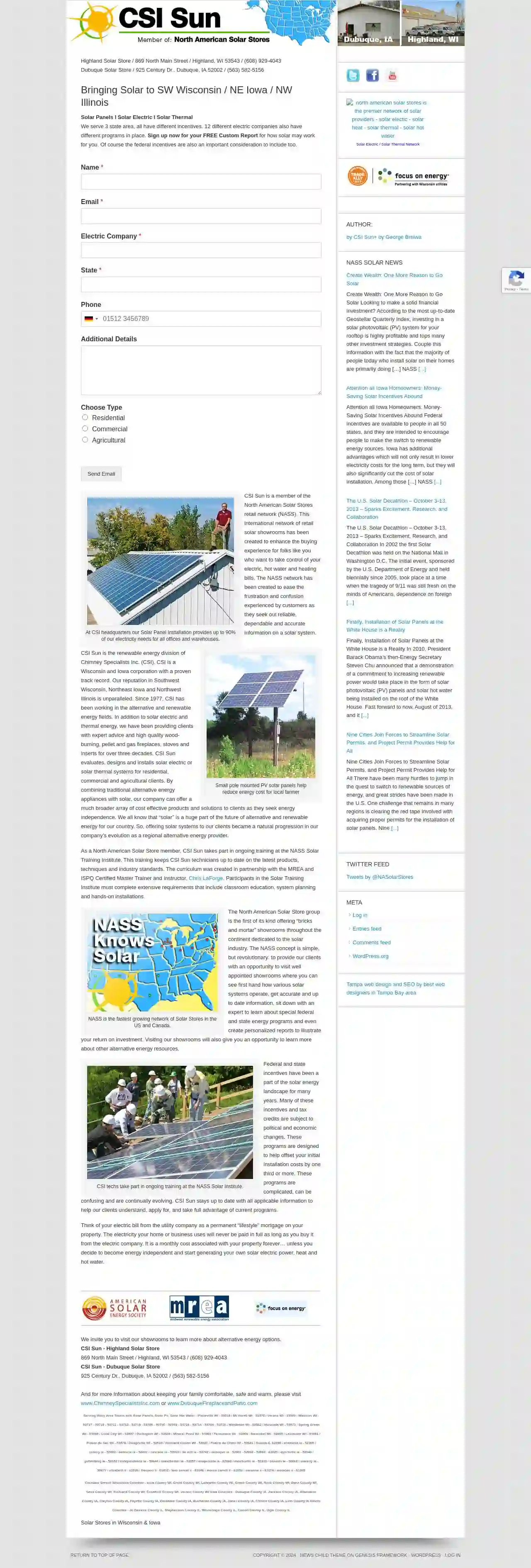
CSI Sun
Highland Solar Store, Highland, WI, 869 North Main Street, 53543, USCSI Sun is a member of the North American Solar Stores retail network (NASS). This international network of retail solar showrooms has been created to enhance the buying experience for folks like you who want to take control of your electric, hot water and heating bills. The NASS network has been created to ease the frustration and confusion experienced by customers as they seek out reliable, dependable and accurate information on a solar system.
- Services
- Why Us?
- Accreditations
- Our Team
- Testimonials
- Gallery
Get Quote
Midwest Solars
53 reviewsMondovi, Wisconsin, United States, 910, Countryside Parkway, 54755, USMidwest Solars, a division of Tecom LLC, started in 2019 as a dream between friends. Tom Wingert, owner of Tecom LLC and Andy Van Roo, decided to form a solar company from the ground up in rural Western Wisconsin. The first project was a commercial building owned by Van Roo. Together, they hope to expand renewable energy in the domestic United States. Tom has a wealth of experience and knowledge with solar in Florida and has worked for Tesla Energy and Amazon. Midwest Solars is actively developing multi Megawatt Projects in Wisconsin, Texas, Ohio, Pennsylvania, Virginia, and Vermont. They serve all 50 states.
- Services
- Why Us?
- Accreditations
- Our Team
- Testimonials
- Gallery
Get Quote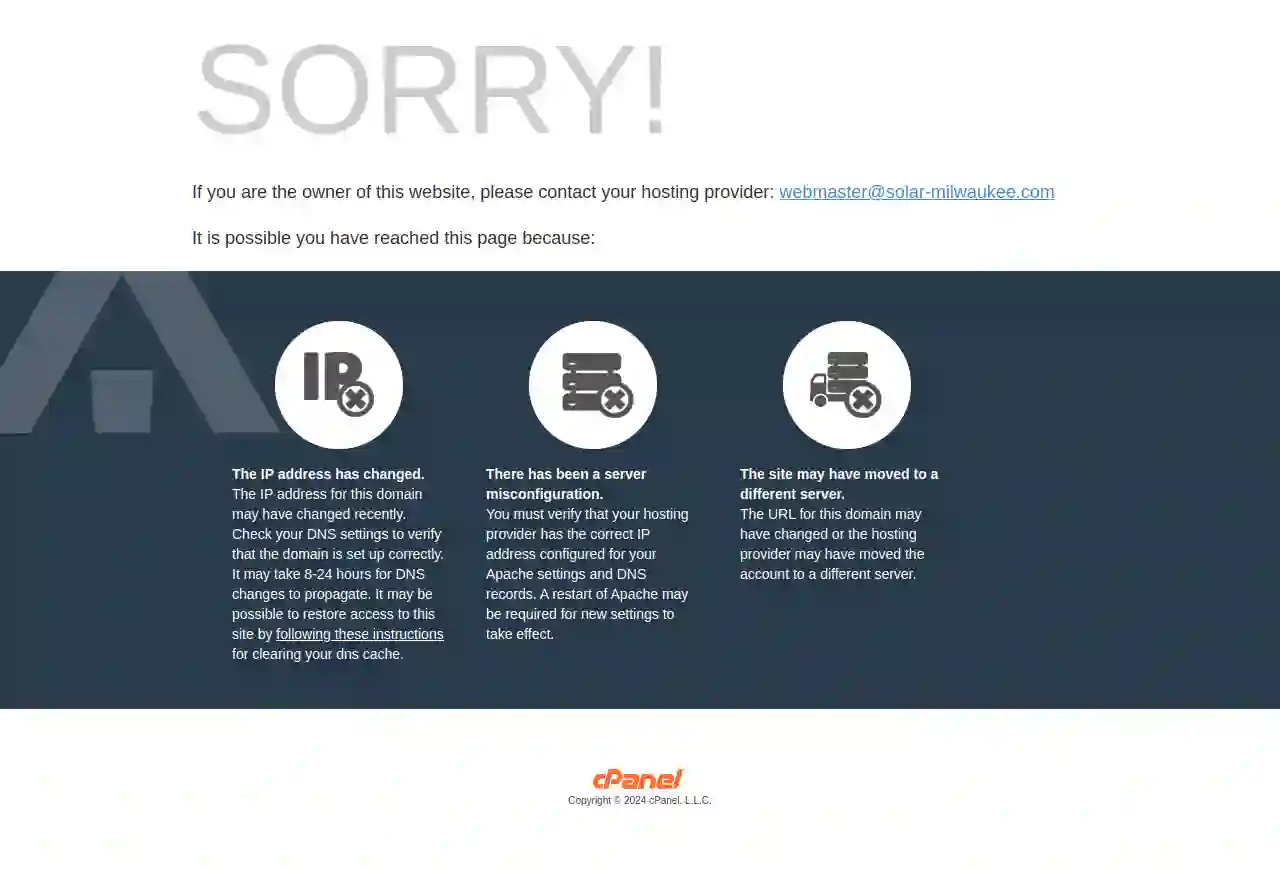
Solar Co of Milwaukee
51 reviewsMilwaukee, Wisconsin, USA, 123 Solar Way, 53202, USSolar Co of Milwaukee is a trusted partner for solar panel installation in the Milwaukee, Wisconsin area. Our network of industry experts specializes in residential and commercial installations, off-grid systems, and energy storage solutions. We are passionate about renewable energy and sustainable practices, providing top-notch service and support from start to finish. Our goal is to help you reduce your carbon footprint and save on your energy bills.
- Services
- Why Us?
- Accreditations
- Our Team
- Testimonials
- Gallery
Get Quote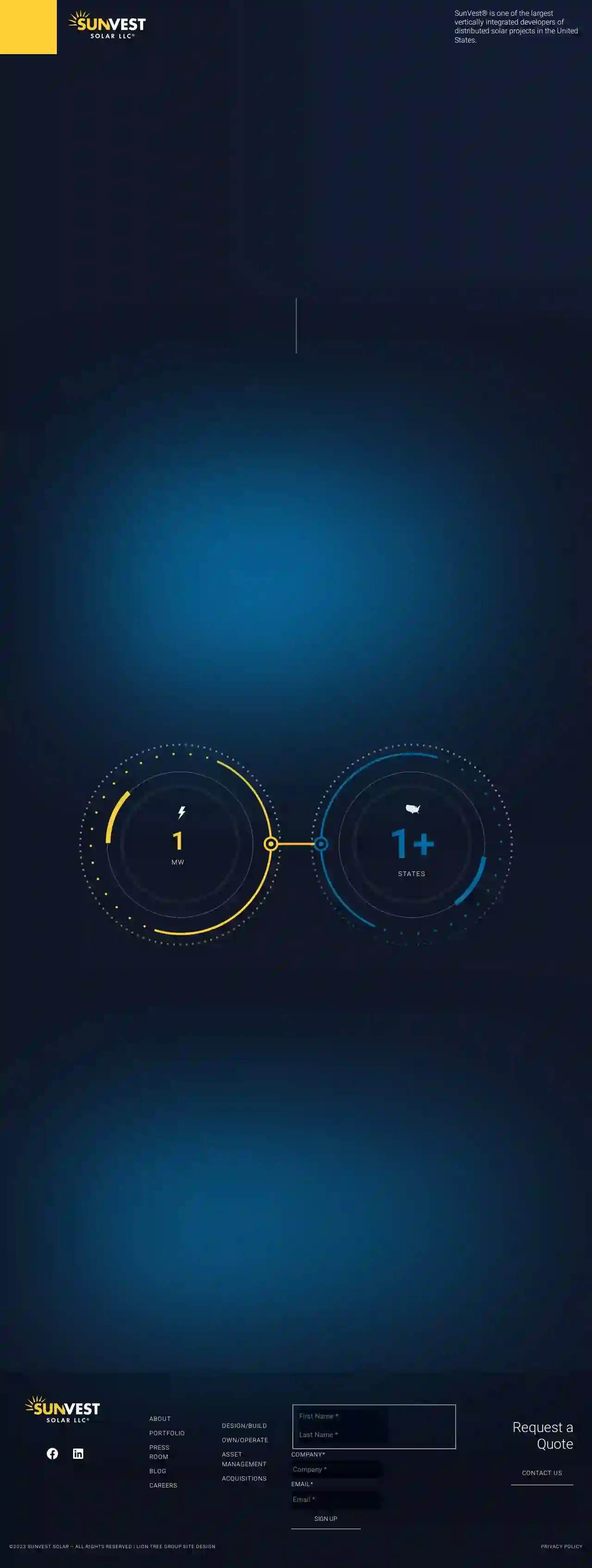
SunVest Solar LLC
4.18 reviewsN27 W24025 Paul Ct, Suite 100, Pewaukee, 53072, USSunVest Solar, LLC is one of the largest vertically integrated developers of distributed solar projects in the United States. Our mission is to advance clean energy nationwide with turnkey, cost-effective solar solutions. We offer business, nonprofit, and utility partners expertise across the value chain, including development, construction, financing, and operations. We develop community solar projects in key markets nationwide, distributed solar for commercial/industrial customers, and solar assets for utilities, co-ops, and municipalities.
- Services
- Why Us?
- Accreditations
- Our Team
- Testimonials
- Gallery
Get Quote
Full Spectrum Solar
597 reviews1240 East Washington Ave, Madison, 53703, USFull Spectrum Solar is a family owned and operated business that has been proudly serving Wisconsin for 20-years. Founded by brothers and UW-Madison Mechanical Engineering alumni, Burke and Mark have always strived to create a company culture that believes that the ethics of good business practice and contributing to the wellness of nature come first. We pride ourselves for how little we focus on marketing and instead believing that through great work and trust, our customers become our greatest supporters as a local small business.
- Services
- Why Us?
- Accreditations
- Our Team
- Testimonials
- Gallery
Get Quote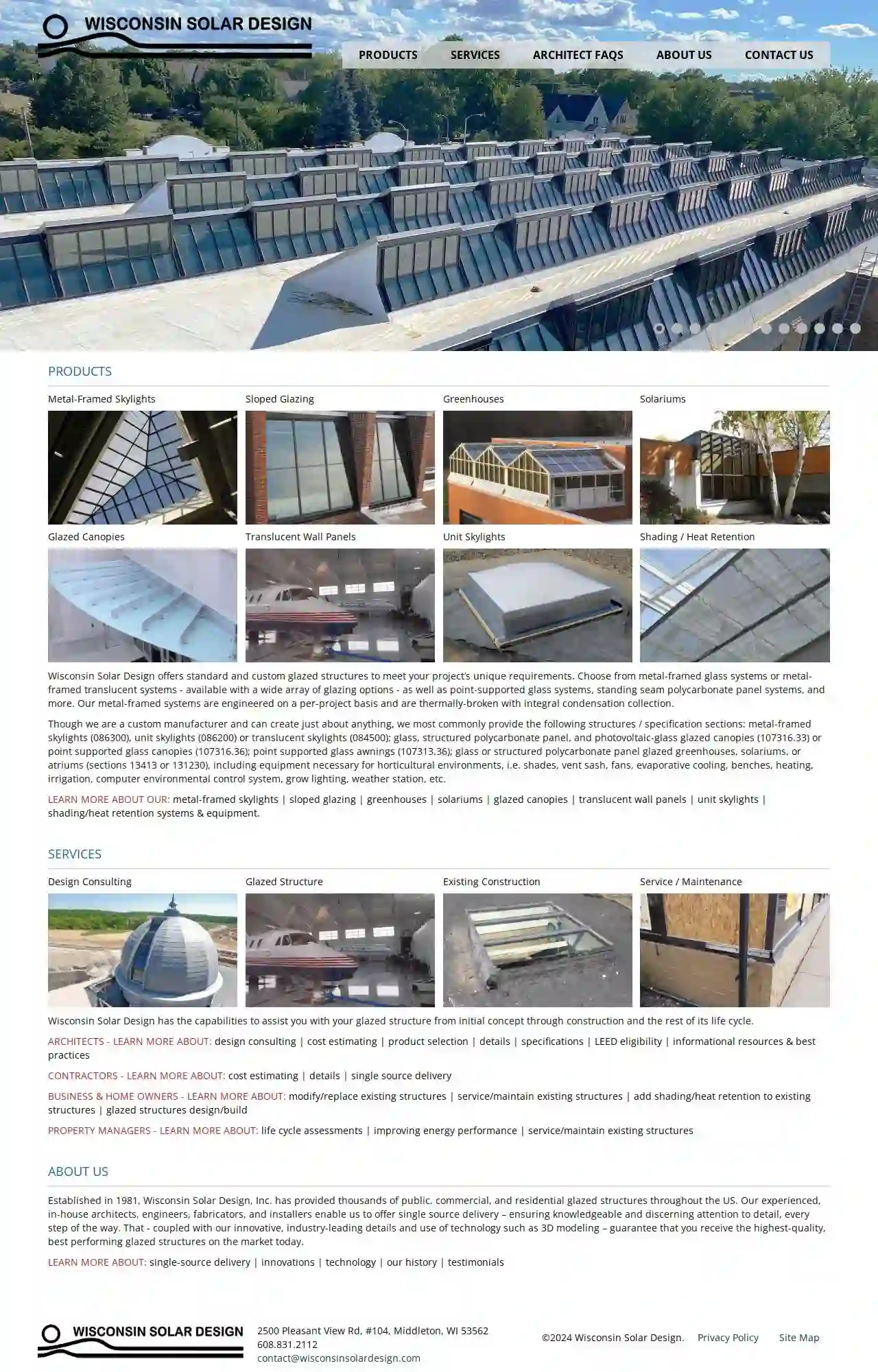
Wisconsin Solar Design Inc.
2500 Pleasant View Road, Middleton, WI 53562, Madison, 53562, USEstablished in 1981, Wisconsin Solar Design, Inc. has provided thousands of public, commercial, and residential clients with custom glazed structures. Their team of architects and engineers utilize the latest in CAD and 3D modeling to prepare drawings and virtually mock-up details. This enables them to quickly and precisely fabricate projects in their modern shop facility. Wisconsin Solar Design offers standard and custom glazed structures to meet unique project requirements, including metal-framed glass systems, metal-framed translucent systems, point-supported glass systems, standing seam polycarbonate panel systems, and more.
- Services
- Why Us?
- Accreditations
- Our Team
- Testimonials
- Gallery
Get Quote
Over 4,210+ Solar Installers registered
Our solar installers operate in Lake Geneva and surroundings!
SolarCompaniesHub has curated and vetted the Best Solar Contractors arround Lake Geneva. Find a top & trustworthy contractor today.
Frequently Asked Questions About Solar Installers
- Monocrystalline: Made from a single silicon crystal, known for high efficiency (typically 18-22%) and sleek black appearance.
- Polycrystalline: Made from multiple silicon crystals, slightly less efficient (15-17%) but often more affordable than monocrystalline.
- Thin-film: Made from thin layers of photovoltaic material, lower efficiency (8-12%) but can be flexible and lightweight.
- Solar Panel Warranty: From the panel manufacturer, typically covering defects in materials and workmanship for 10-25 years. Some manufacturers offer performance guarantees, ensuring a certain level of energy output over time.
- Solar Installation Warranty: From the solar installer, covering the quality of the installation work for 1-10 years. This warranty protects you from leaks, faulty wiring, or other issues caused by improper installation.
- Keep Panels Clean: Clean panels periodically to remove dirt, debris, and bird droppings, which can reduce efficiency. Rainfall usually cleans panels adequately, but you might need to hose them down occasionally.
- Visual Inspections: Regularly inspect panels for signs of damage, loose wiring, or other issues.
- Professional Maintenance: Consider having a professional solar installer inspect your system every few years to ensure optimal performance.
Do I need planning permission to install solar panels in USA?
What are the different types of solar panels?
What kind of warranty should I expect for my solar panel system?
How do I maintain my solar panels?
Do I need planning permission to install solar panels in USA?
What are the different types of solar panels?
- Monocrystalline: Made from a single silicon crystal, known for high efficiency (typically 18-22%) and sleek black appearance.
- Polycrystalline: Made from multiple silicon crystals, slightly less efficient (15-17%) but often more affordable than monocrystalline.
- Thin-film: Made from thin layers of photovoltaic material, lower efficiency (8-12%) but can be flexible and lightweight.
What kind of warranty should I expect for my solar panel system?
- Solar Panel Warranty: From the panel manufacturer, typically covering defects in materials and workmanship for 10-25 years. Some manufacturers offer performance guarantees, ensuring a certain level of energy output over time.
- Solar Installation Warranty: From the solar installer, covering the quality of the installation work for 1-10 years. This warranty protects you from leaks, faulty wiring, or other issues caused by improper installation.
How do I maintain my solar panels?
- Keep Panels Clean: Clean panels periodically to remove dirt, debris, and bird droppings, which can reduce efficiency. Rainfall usually cleans panels adequately, but you might need to hose them down occasionally.
- Visual Inspections: Regularly inspect panels for signs of damage, loose wiring, or other issues.
- Professional Maintenance: Consider having a professional solar installer inspect your system every few years to ensure optimal performance.